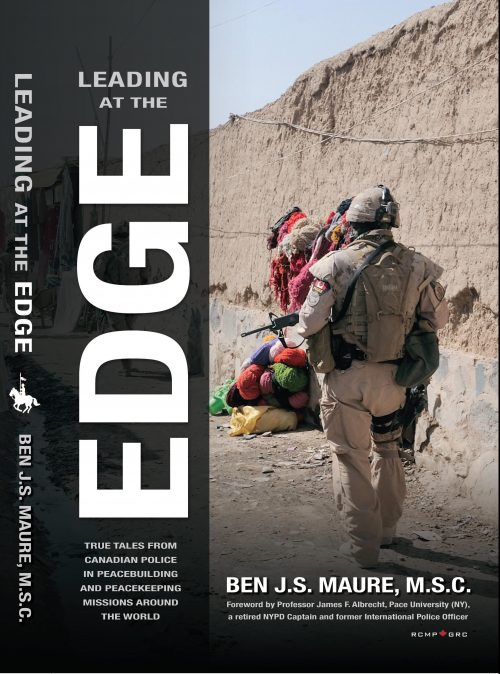
Features
Off the Shelf
Leading at the Edge by Ben J.S. Maure
October 22, 2020 By Lieutenant Colonel Michael A. Rostek

Leading at the Edge: True Tales from Canadian Police in Peacebuilding and Peacekeeping Missions around the World*
By Ben J.S. Maure; 2020, 349 pages
ISBN: 978-0995034303
There has been an ongoing acknowledgement of the need to practice a more co-ordinated and holistic approach to complex security challenges. To this end, a new form of collective action calls for the inclusion of a variety of actors and agencies through greater levels of co-ordination and collaboration, thereby integrating as a whole, with a view to generating lasting solutions to the complex security challenges which confront us today.
A key constituent to this process are police forces. Their mission somewhat differs for that of traditional defence forces but is of no less importance in achieving lasting solutions to the complex security challenges we face. Ben Maure’s book, Leading at the Edge, offers magnificent insight into the complexities and challenges faced by police officers who constitute this vitally important component of the inter-agency team. The 10 case studies presented from operations around the world both broadens and deepens our understanding of international policing complexities and challenges. In addition, the appendices offer further insight into the policing selection processes as well as a very insightful appendix on peacebuilding, peacekeeping, and peacemaking.
From Afghanistan to Bosnia to South America, Maure presents each case with an easily read and consistent format, which covers the history of the conflict, pre-deployment issues and individual stories offering lessons learned and advice from those who have experienced “leading at the edge.” Maure highlights the unique nature of each of the operations, emphasizing that pre-deployment training — while useful to a certain extent — seems to insufficiently prepare police officers for the uncertain and complex environments they are about to face. For example, the use of aircraft with rather questionable serviceability records, complete with some emergency exits welded shut, facing a devastating earthquake in Haiti, or being propelled into the middle of a “war zone” all highlight the unique and uncertain environments thrust upon the police officers unaccustomed to such environments.
As such, a common theme through each of the cases in the book involves examining the motivations of the police officers who must first apply for international policing operations and a leave of absence form their domestic policing duties before being selected. Highlighting flexibility of mind, optimism and an adventurous spirit, Maure admits international policing operations are certainly not for everyone. Those who have answered the call to serve and protect beyond the borders of Canada have distinguished themselves well in their conduct and contribution to operations, be it in intelligence, crimes scene operations, training, or building police forces in countries devastated by conflict or natural disasters.
While this book is unquestionably apt for students and practitioners in the fields of security studies, politics and international relations, it is equally an interesting and compelling read for the casual observer of global affairs.
Overall, Maure has compiled an impressive series of case studies on the complexities of policing in international security operations. The book offers useful insight and both broadens and deepens our understanding of the multifaceted challenges and complexities of international policing operations. A welcomed and much needed contribution to the field of security studies.
– Lieutenant Colonel Michael A. Rostek, CD, PhD, APF, Adjunct Professor, Ontario Tech University
* Review previously published in Canadian Army Journal.
Print this page